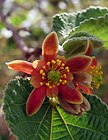Note: This is a project under development. The articles on this wiki are just being initiated and broadly incomplete. You can Help creating new pages.
Difference between revisions of "Grewia villosa"
(→Parts Used) |
|||
| Line 5: | Line 5: | ||
==Parts Used== | ==Parts Used== | ||
| − | {{Parts Used|Fruits}}. | + | {{Parts Used|Fruits}}, {{Parts Used|Root}}, {{Parts Used|Bark}}, {{Parts Used|Small stem}}. |
==Chemical Composition== | ==Chemical Composition== | ||
Revision as of 10:23, 11 May 2021
Grewia villosa is usually a deciduous, much-branched shrub growing from 1 - 4 metres tall, though it sometimes becomes more tree-like and up to 4.5 metres tall. The tree is harvested from the wild for local use as a food, medicine and source of materials.
Contents
- 1 Uses
- 2 Parts Used
- 3 Chemical Composition
- 4 Common names
- 5 Properties
- 6 Habit
- 7 Identification
- 8 List of Ayurvedic medicine in which the herb is used
- 9 Where to get the saplings
- 10 Mode of Propagation
- 11 How to plant/cultivate
- 12 Commonly seen growing in areas
- 13 Photo Gallery
- 14 References
- 15 External Links
Uses
Body pains, Wounds, Syphilis, Smallpox.[1]
Parts Used
Fruits, Root, Bark, Small stem.
Chemical Composition
Common names
| Language | Common name |
|---|---|
| Kannada | Butti-aaragale |
| Hindi | Baliogangarin |
| Malayalam | |
| Tamil | Kullai |
| Telugu | Banta |
| Marathi | Kharmati |
| Gujarathi | |
| Punjabi | |
| Kashmiri | |
| Sanskrit | |
| English | Hairy Crossberry |
Properties
Reference: Dravya - Substance, Rasa - Taste, Guna - Qualities, Veerya - Potency, Vipaka - Post-digesion effect, Karma - Pharmacological activity, Prabhava - Therepeutics.
Dravya
Rasa
Guna
Veerya
Vipaka
Karma
Prabhava
Habit
Identification
Leaf
| Kind | Shape | Feature |
|---|---|---|
| Thread like | Densely star shape | 1-2.5cm long |
Flower
| Type | Size | Color and composition | Stamen | More information |
|---|---|---|---|---|
| Ovary spherical | 2cm across | Whitish yellow | 25-30 stamens | Densely covered with antrorse hairs, 4 lobed stigma |
Fruit
| Type | Size | Mass | Appearance | Seeds | More information |
|---|---|---|---|---|---|
| Drupe | 1cm in diameter, 8mm long | Heart shaped at the base | Densely hairy, Yellow brown or cropped red |
Other features
List of Ayurvedic medicine in which the herb is used
Where to get the saplings
Mode of Propagation
How to plant/cultivate
A plant of drier areas in the tropics, where it is found at elevations up to 1,200 metres.[4]
Commonly seen growing in areas
Acacia-Terminalia-Combretum woodland, Limestone areas, Arid hills, Acacia bush.
Photo Gallery
References
- ↑ Indian Medicinal Plants by C.P.Khare
- ↑ [Chemistry]
- ↑ Kappatagudda - A Repertoire of Medicianal Plants of Gadag by Yashpal Kshirasagar and Sonal Vrishni, Page No. 212
- ↑ Cultivation
External Links
- Ayurvedic Herbs known to be helpful to treat Body pains
- Ayurvedic Herbs known to be helpful to treat Wounds
- Ayurvedic Herbs known to be helpful to treat Syphilis
- Ayurvedic Herbs known to be helpful to treat Smallpox
- Herbs with Fruits used in medicine
- Herbs with Root used in medicine
- Herbs with Bark used in medicine
- Herbs with Small stem used in medicine
- Herbs with common name in Kannada
- Herbs with common name in Hindi
- Herbs with common name in Tamil
- Herbs with common name in Telugu
- Herbs with common name in Marathi
- Herbs with common name in English
- Habit - Deciduous shrub
- Index of Plants which can be propagated by Seeds
- Herbs that are commonly seen in the region of Acacia-Terminalia-Combretum woodland
- Herbs that are commonly seen in the region of Limestone areas
- Herbs that are commonly seen in the region of Arid hills
- Herbs that are commonly seen in the region of Acacia bush
- Herbs
- Pages without herbs images


